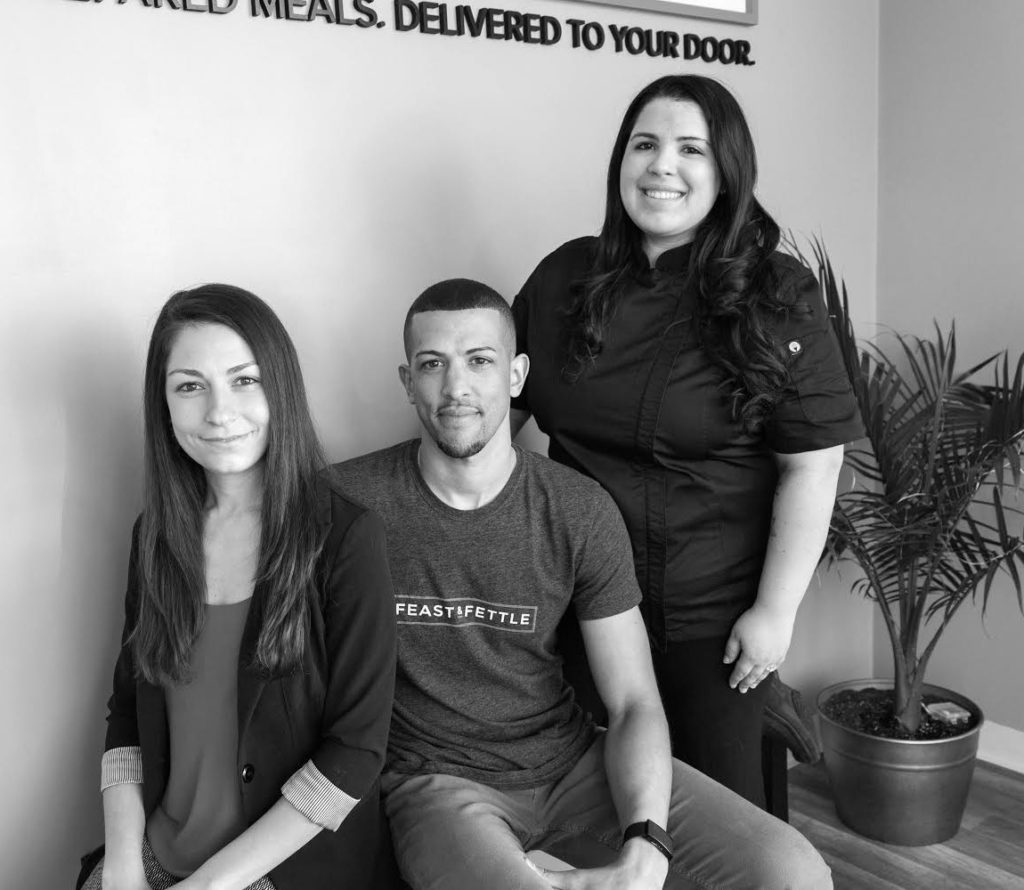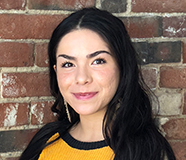While completing her Culinary Nutrition program at Johnson & Wales University, Maggie Mulvena Pearson worked as a personal chef. Having the idea to cook personal meals for more families, she recruited her high-school best friend, brought on a strategic business partner, and started her meal delivery service, Feast & Fettle. Making customer service their specialty, the team grew membership from one family to three hundred. We sat down with Maggie and her partners to talk about fundraising a startup, the power of partnerships, and their strategic growth.
Serena Manna: What is your mission at Feast & Fettle?
Carlos Ventura: We bring a high-end meal delivery service experience into the home. What you’ll find with Feast & Fettle is that the quality of the food and the quality of the customer service is much higher than in other meal delivery services, and that is really how we try to differentiate. It sounds simple, but the execution is where it gets difficult.
“We are a food business first. We care about the food, we care about what we do, and there’s a lot of effort that goes into it.”
SM: How did you start?
Maggie Mulvena Pearson: During my time in culinary school at Johnson & Wales University, I was nannying for a physician in Providence. After seeing what I could do for her and her family, I wanted to expand my service to more busy families that needed help in the kitchen. Seeing if there was any interest for this type of service, I reached out about my services through the MomDocFamily Brown University listserv and received an unexpected amount of responses. I ended up taking on four additional families, and upon graduation from culinary school that number increased to eight families. I kept getting more inquiries to cook for more families so at that point I decided to formalize my business. I took a couple business planning courses and asked my best friend from high school, Nikki, to quit her job in hospitality to partner with me. In the beginning it really was just her and I doing every aspect of the business.
SM: You trained as a chef. How did you turn your skills into a business?
MMP: I have never worked in a true corporate or restaurant setting so I guess you could say I have been an entrepreneur since college. That path I chose served me well in one instance because I didn’t go through the transition of working for a company, receiving a steady paycheck, to living the life of an entrepreneur. It was my partners who made the transition from being trained in one thing, working their industry, and then completely redirecting those skills to build Feast & Fettle with me.
“Bringing on new partners allowed us to focus on new things. While it meant me giving up a percentage of the company, I didn’t want to own one hundred percent of a business that wasn’t going to make money.”
Being a chef and not having formal business training, the entrepreneurial decisions that made a difference were taking business planning classes to write a formal business plan and bringing on my partners Nikki Oliveira and Carlos Ventura to join the company.
SM: How did bringing on partners help your business grow?
MMP: Feast & Fettle would not be here without partnerships. Bringing on new partners allowed us to focus on new things. While it meant me giving up a percentage of the company, I didn’t want to own one hundred percent of a business that wasn’t going to make money. Money is such a crucial part of running a business, and with only Nikki and I to manage operations we had the product, we had members, and we needed help strategizing our growth.
When you don’t have money to hire a CEO, giving up equity is an option. Our strong retention rates with our customers allowed Carlos to come on because he saw the value in those relationships we were building with families. Carlos has the business and marketing side that I didn’t have as a culinary nutrition student, and Nikki applied her experience in hospitality management. Our skill sets are all different between the three of us.
SM: What do you want the community to know about the services you provide?
CV: As a tech-enabled business, we interact with our members primarily online, but it doesn’t mean we won’t pick up the phone or help customers place their orders. We go above and beyond because we know we don’t have the opportunity to engage in the same fashion as when a customer walks into a physical restaurant. We have to create a virtual setting and feeling when customers visit our website. We are a food business first. We care about the food, we care about what we do, and there’s a lot of effort that goes into it.
MMP: We have bigger visions beyond Rhode Island and we are very conscious of not scaling too quickly. We want to be big, but we want to be big in a thoughtful way.
“Word of mouth continues to be one of our primary sources of acquisition. To us, what that means is having an amazing product so people will talk about it.”
We’re extremely conscious about our impact on the environment. We regularly donate our reusable bags and have constructed a system that yields little-to-no food waste. We are also obsessed with providing exceptional customer service across all communication channels. Whether it’s through email, phone, or live chat, we are available within minutes for any customer who needs assistance.
SM: How did you get connected with SEG?
MMP: Through our work at Hope & Main we were connected with SEG’s services and network. SEG is the reason we are connected with our current partner, Edesia. We donate a dollar of every order to Edesia Nutrition. We always wanted community giveback in our model and that became possible once we got connected to SEG. Last year we donated $7,000 and as we grow the donation to Edesia grows.
SM: You received a loan through SEG’s Loan Fund. What was your experience raising capital as a startup?
MMP: Prior to profitability, we had trouble with banks because they want to see you’re generating cash. They’re not interested if you’re projected to make $200K – you need to already have it. A bank is not going to give you money without revenue, and even with micro-lenders it’s just not possible to get lending without some type of revenue. I had a business plan, a little bit of revenue, $32,000 raised pre-friends and family round, and help from Carlos to build a pitch deck for SEG’s loan application.
“This is a capital intensive business. You need equipment, you need vans, and of course you need your people. The loan allowed us to fund the operational pieces of both the website build-out and equipment purchases.”
SM: What’s your advice for someone preparing a pitch deck?
CV: We’ve always used realistic numbers in our projections. Many startups create a business plan to justify a valuation that is not real, then you have to do it, and then you’re raising money pretty much to survive.
Maggie developed Feast & Fettle’s first business plan, hired her best friend, and sold her car to buy her first van. When speaking to investors, we tell that story to show how committed she is to building the business – she has skin in the game. It hasn’t been easy for us to raise money because we aren’t telling people we’re going to grow at astronomical rates.
Everyone has a different risk appetite, and we will raise what we need, when we need it. The largest fundraising round we did was to build our kitchen, and that was for exactly what it cost. We’ve been more or less bootstrapping from the beginning which has helped us.
SM: How did the SEG loan fund help?
CV: Looking at the deck we pitched to SEG’s Loan Committee back in 2017, our projections were almost exact, while how we got there was not at all what we predicted. This is a capital intensive business. You need equipment, you need vans, and of course you need your people. The loan allowed us to fund the operational pieces of both the website build-out and equipment purchases. Those initial two years of research and development at Hope & Main, time spent speaking with our members, getting the product to market fit – we were ready to grow.
SM: How many staff members have you brought on?
Nikki Oliveira: After the SEG Loan in 2018, we were able to bring on four full-time staff. We currently have a total of eighteen staff members. We’ve hired an impressive amount of people for a small startup.
SM: How are you doing in acquiring members?
CV: When we left Hope & Main in 2018 we had about a hundred members, and today we’ve scaled to over three hundred. Word of mouth continues to be one of our primary sources of acquisition. To us, what that means is having an amazing product so people will talk about it. We tried radio, TV (The Rhode Show), printed postcards, and struck a partnership with Seven Stars and Ellie’s. There is a hustle element to it.
“Understanding our customer and how to bring them value is our only strategy.”
We used “old school” marketing to get awareness out there and once we cracked the code on digital, we made a pretty swift transition. I don’t have a marketing background, but it’s all I’ve been doing for the past two years. Digital has been more effective for us because it is effective and measurable. Other forms of older advertising are expensive, difficult to measure and also very challenging to reach the right demographic. Many people give up on digital because they essentially create ‘commercials’ for social. Understanding our customer and how to bring them value is our only strategy – whether we are paying for ad space or its organic traffic.
SM: What’s it been like to build a partnership with local purveyors like Seven Stars and Ellie’s?
MMP: The partnerships we have are brand aligned. For example, we knew we wanted bread on the menu, so instead of purchasing the equipment and trying to make a product as good as those who do it best, we reached out to Seven Stars. When we outsource, we want to make sure we are working with the best purveyors.
SM: You’ve cooked for many families over the years – what are some of your favorite meals?
CV: Our veggie burger!
NO: Quinoa kimchi fried rice!
MMP: Any of the surprise meals we’ve delivered to those in hospital and in treatment!
SM: What are your future goals for 2020?
CV: Continued expansion to serve more customers and members, specifically in Rhode Island and Massachusetts. Our business has doubled in size every year and we have plans to double again in 2020.
By Serena Manna
SEG Communications Coordinator


